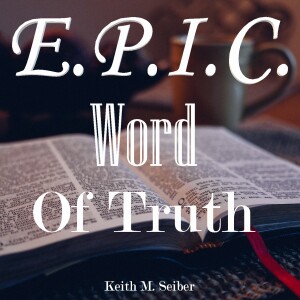Episodes

Thursday Jan 22, 2026
The Unshakable King (Psalm 93)
Thursday Jan 22, 2026
Thursday Jan 22, 2026
The Lord Reigneth — The Unshakable King! In a culture shaking under judgment, Psalm 93 anchors our souls: “The LORD reigneth… the world also is stablished, that it cannot be moved.” (Psalm 93:1, KJV). Stand holy, speak truth, take courage—Christ is King, and HE is mightier than the floods.
Please visit:
Anchored & Advancing Podcast of New Beginning Baptist Church
Faith Foundations – Foundational Teaching for the Church
New Home Page - New Beginning Baptist Church of Palm Coast, FL

Tuesday Jan 20, 2026
Steadfast Unmovable Always Abounding (1 Corinthians 15:58)
Tuesday Jan 20, 2026
Tuesday Jan 20, 2026
Hear episode 1 of Anchored & Advancing
In this powerful exposition of 1 Corinthians 15:58, discover what it means to live the Christian life with unwavering faith and purpose in today's challenging world.
Please visit:
Faith Foundations – Foundational Teaching for the Church
New Home Page - New Beginning Baptist Church of Palm Coast, FL

Thursday Aug 07, 2025
Be Thou an Example (1 Timothy 4:12-16)
Thursday Aug 07, 2025
Thursday Aug 07, 2025
You may feel too young, you may feel too old, or unqualified, or unsure. But if you are in Christ, you are not disqualified. You are not second-tier. You should not and do not have to wear a permanent label on your chest from something that is long ago in your past.
You are called to be an example. Not for your glory—but for His. This isn’t just a message for young pastors—it’s a call for every believer to become the kind of Christian that turns heads.
Not because we draw attention to ourselves—but because we shine the spotlight on Christ.
Not because of ourselves, but because God can and will use anyone to do anything for Him – regardless whether men say we can’t do what Christ calls us to do – we are to follow Christ – for He is the head of the Church and the Living Word of God. He is the final arbiter of what we can or cannot do for Him and His church.

Tuesday Aug 05, 2025
The Mystery of the Church (1 Timothy 3:14-16)
Tuesday Aug 05, 2025
Tuesday Aug 05, 2025
In this sermon, I want you to think about BELIEF and BEHAVIOR. Paul says here that how one ought to behave in the house of God (the church), is connected to what we confess, what we believe to be true.
Vince Lombardi, the Hall of Fame coach of the Green Bay Packers, was notorious for his emphasis on fundamentals. His teams won championships because they could block, tackle, and execute better than anyone else.
It is said that once, frustrated by his team's poor performance, he held up a football and said, “Gentlemen, this is a football!”
He knew their core knowledge, their core beliefs about the game of football, affected their performance or their behavior on the field. Like Coach Lombardi, the apostle Paul knew well the importance of going back to the fundamentals.
He penned this letter to Timothy because the church at Ephesus was starting to drift away from the basic truths of the Christian faith. Like the Ephesians, we need regularly to be reminded of the foundational truths of our faith. So, Paul writes this passage as a reminder that the church must give its attention to the essential truths.
Contact us @4faithfoundations@gmail.com
Visit our website @ faithfoundations.church

Sunday Aug 03, 2025
Until Shiloh Comes (Genesis 49:10)
Sunday Aug 03, 2025
Sunday Aug 03, 2025
Genesis 49:10 "The sceptre shall not depart from Judah, nor a lawgiver from between his feet, until Shiloh come; and unto him shall the gathering of the people be."
In this sermon, I want to show you that in a world full of broken promises and failed kings, there is one who came to be everything your soul has been searching for. He is called Shiloh here in Genesis chapter 49, and He changes everything.
Contact us @4faithfoundations@gmail.com
Visit our website @ faithfoundations.church

Friday Jul 25, 2025
The Siege, the Spirit, & the Savior (Revelation 19:10-11; Daniel 9:24)
Friday Jul 25, 2025
Friday Jul 25, 2025
What happens when an entire nation simultaneously cries out to Jesus?
What You'll Learn in This Sermon: ✅ Why Israel must endure the Age of the Gentiles (6 biblical reasons revealed) ✅ The shocking truth about the Mosaic Covenant still binding Israel today ✅ How the War of Armageddon leads to the greatest revival in history ✅ The exact moment Jesus returns to earth (timing revealed in Hosea 6:1-2) ✅ Why God allows desperate circumstances to bring breakthrough ✅ How an entire nation gets saved in a single day ## Key Bible Passages Covered: - Daniel 9:24 - The 70 weeks prophecy - Zechariah 12:10 - Israel looks upon Him whom they pierced - Romans 11:25-27 - All Israel shall be saved - Zechariah 14:1-2 - The siege of Jerusalem - Hosea 6:1-2 - The third day miracle
Contact us @ 4faithfoundations@gmail.com
For more teaching, sermons, doctrinal teachings, & resources, visit our website @ faithfoundations.church

Thursday Jul 24, 2025
Prisoner of Hope (Zecheriah 9:12)
Thursday Jul 24, 2025
Thursday Jul 24, 2025
Hear what it means to be a prisoner of hope, not of our circumstances, not of sorrow, not of the valley, but a prisoner of hope, a prisoner of our Lord Jesus Christ.
Contact us @ 4faithfoundations@gmail.com
For more resources, studies, and expositional teaching, visit our website @ faithfoundations.church

Sunday Jul 20, 2025
Godliness, Grit & the Gospel (1 Timothy 4:8-11)
Sunday Jul 20, 2025
Sunday Jul 20, 2025
What’s the thing you’re afraid of losing? The thing you’re chasing, whether you realize it or not? Maybe it would take several moments to really deeply consider the answer to that question.
Perhaps it is a career? A sense of security? A certain lifestyle? Your children’s success? Your own comfort?
Let’s take it a step further now. What are you training for? You might say, “I’m not training for anything.” But that’s really not true.
You are always training. Every day, every choice, every priority—it's shaping you. You're not static. You're becoming something. You’re preparing for something. And eventually, you’ll stand before Someone.
Here’s the problem: most people are spending their lives training for things that won’t matter 100 years from now.
They spend years in the gym shaping a body that will eventually weaken. They obsess over finances, storing up treasures they cannot take with them. They build a resume that cannot be read in Heaven.
And here’s the question: Is it worth it? Will it last?
Contact us @4faithfoundations@gmail.com
Visit our website for more teaching, resources, blog posts & more @ faithfoundations.church

Thursday Jul 17, 2025

Monday Jul 14, 2025
Long-Form Repentance (Ezra 9, Nehemiah 9, Daniel 9)
Monday Jul 14, 2025
Monday Jul 14, 2025
Have we made repentance too easy?
We live in an instant world—instant coffee, instant messaging, instant everything. And somewhere in our convenience culture, we’ve tried to make repentance instant too. Just repeat after me. Quick prayer. Raised hand. Walk an aisle. Done.
But here's the thing—that’s not what we necessarily see in Scripture.
That’s not how people respond when they encounter the holiness of God and the weight of their sin.
Now someone might say, “What about the thief on the cross?” Good question. Yes, he was saved in his final moments—when he cried, “Lord, remember me when thou comest into thy kingdom” (Luke 23:42).
But look closer. In those few breaths, he acknowledged his guilt—“we receive the due reward of our deeds” (Luke 23:41). He declared Christ's innocence—“this man hath done nothing amiss” (Luke 23:41). And he placed his faith in Christ's kingdom. That’s real repentance. Not rushed. Real.
It wasn’t about time. It was about the heart.
Some people have years and never truly repent. The thief had moments—and did. What I’m calling “long form repentance” isn’t about time on a clock. It’s about depth. Sincerity. Transformation.

E.P.I.C Word of Truth
This is the podcast of Pastor Keith Seiber of New Beginning Baptist Church of Palm Coast, FL. Our name stands for Eternal Power in Christ the Word of Truth. Christ is Truth. It is through Christ that we can have eternal life. It is through a vibrant relationship with Him that we can have a joyous and fruitful Christian life. This podcast is a feeble attempt to help to edify the believers and point all who listen to Christ and life eternal in and through Him.






